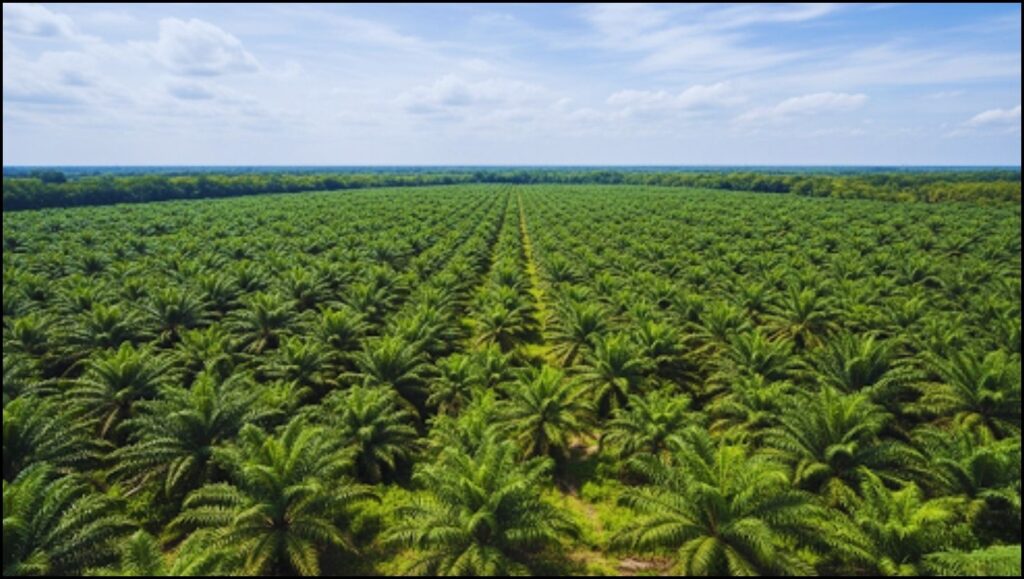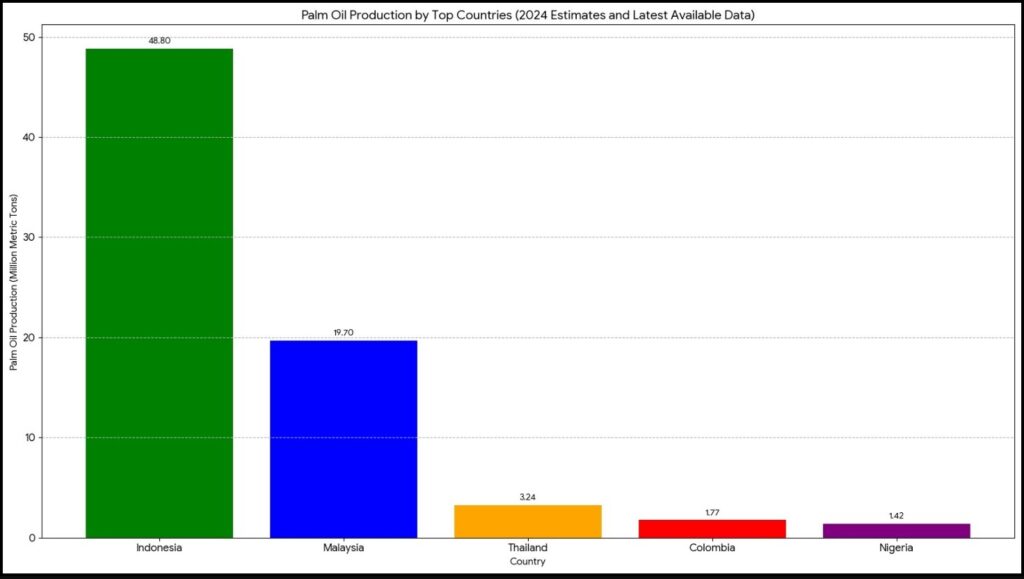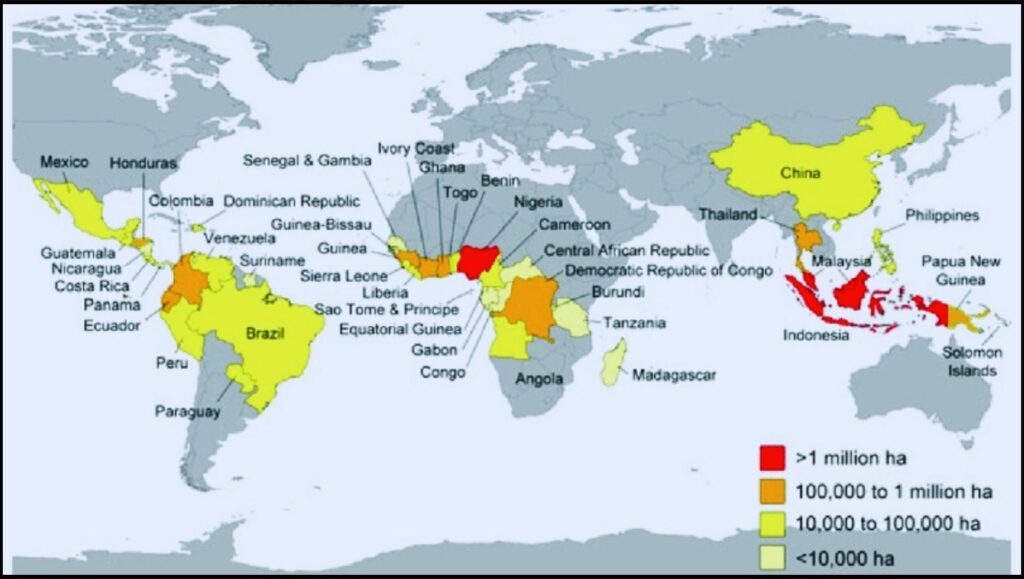Indonesia has firmly established itself as the world’s largest palm oil producer, a position it has held for over a decade. The Southeast Asian nation’s palm oil industry is a critical component of its economy, generating billions in export revenue and providing employment for millions. This dominance, however, comes with significant scrutiny over its environmental and social impacts, including deforestation and land rights issues, placing the nation at the center of a complex global debate.

The Economic Engine of Southeast Asia
The scale of Indonesia’s palm oil production is unparalleled. According to data from the Council of Palm Oil Producing Countries (CPOPC), Indonesia accounts for approximately 59% of the world’s total palm oil production. This immense output far surpasses that of the second-largest producer, Malaysia, which contributes around 25%. The two nations together are responsible for more than 80% of the world’s palm oil supply, giving them significant influence over global markets and prices.
Palm oil is a versatile vegetable oil used in a vast range of products, from food items like cooking oil and margarine to cosmetics, soaps, and biofuels. The consistently high global demand for this commodity has fueled the expansion of Indonesia’s industry. The Indonesian Palm Oil Association (GAPKI) reported that in 2023, the country produced approximately 47 million metric tons of crude palm oil. This output makes it not only the largest producer but also the largest exporter, with significant volumes shipped to major markets like India, China, and the European Union.
The economic benefits of this industry are undeniable. Palm oil is a key driver of Indonesia’s economic growth, representing a significant portion of the country’s gross domestic product (GDP) and export earnings. The sector also serves as a major source of employment, with over 16 million Indonesians directly or indirectly dependent on the industry for their livelihoods, according to a report by the Stockholm Environment Institute (SEI). These jobs, many of which are in remote rural areas, have been instrumental in poverty alleviation and local development.
The Challenge of Sustainability and Deforestation
Despite its economic importance, the rapid expansion of oil palm plantations has been a source of intense international criticism. For years, environmental groups have highlighted the link between palm oil production and large-scale deforestation, particularly in the tropical rainforests of Sumatra and Borneo. This deforestation has been cited as a primary driver of habitat loss for endangered species like orangutans, tigers, and rhinos, and has contributed to significant greenhouse gas emissions through the clearing and burning of carbon-rich peatlands.
A 2022 analysis by SEI noted that industrial oil palm-driven deforestation had declined significantly over the past decade, a trend it attributed to a combination of stricter government policies, corporate “zero-deforestation pledges,” and a slowdown in new land development. However, the report also observed a slight reversal in this trend in 2022, with a notable increase in deforestation on the island of Sumatra. This indicates that while progress has been made, the challenge of balancing economic growth with environmental protection remains a delicate and ongoing task.
Indonesia’s government has taken steps to address these concerns. In 2018, it implemented a moratorium on new oil palm plantation licenses and a review of existing permits. The country has also promoted its own sustainability certification standard, the Indonesian Sustainable Palm Oil (ISPO), which mandates legal compliance and best practices for producers.
“We recognize the global concerns and are committed to ensuring our palm oil is produced sustainably,” said [Official’s Name], a spokesperson for the Indonesian Ministry of Agriculture. “Our ISPO certification is a testament to our efforts to create a responsible and transparent supply chain, and we continue to strengthen its standards.”

Global Market Dynamics and Trade Relations
The global palm oil trade is not solely driven by production; it is also heavily influenced by international policy and consumer preferences. The European Union, a major importer, has been at the forefront of regulations aimed at curbing what it views as unsustainable palm oil production. The EU’s Deforestation Regulation (EUDR), which requires companies to prove their products do not originate from recently deforested land, has created tension with Indonesia and Malaysia.
Both countries have criticized the EUDR, viewing it as a protectionist measure that unfairly targets their key export commodity. In a joint statement, officials from Jakarta and Kuala Lumpur argued that the policy disregards the efforts they have made toward sustainable production and could negatively impact smallholder farmers who lack the resources to comply with complex traceability requirements.
In response, Indonesia and Malaysia have strengthened their cooperation on palm oil issues, including conducting a joint mission to Brussels to advocate for their industries. This collaborative effort highlights the shared economic interests of the two nations and their determination to protect a sector that is vital to their respective economies.

The Future Outlook
The future of the largest palm oil producer is a mix of challenges and opportunities. On one hand, global demand for edible oils is projected to continue rising, particularly from emerging economies. This offers Indonesia a sustained opportunity for economic growth. On the other hand, the industry faces persistent pressure to improve its environmental record, increase transparency, and address social issues.
Domestically, Indonesia is also seeking to diversify its use of palm oil. The government has pushed to increase the mandatory palm oil content in its biodiesel program, a move that aims to reduce the country’s reliance on fossil fuels and create a larger domestic market for the commodity. This policy, however, also has the potential to redirect palm oil away from export markets, creating shifts in global supply and demand.
The path forward for Indonesia will require a delicate balance of economic pragmatism and sustainable development. The country must navigate international trade disputes while ensuring its policies not only benefit its economy but also protect its unique and fragile ecosystems for future generations.
The Agricultural Juggernaut: How China Became the World’s Largest Carrot Producer
